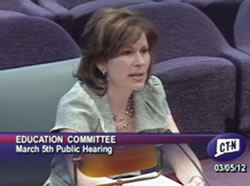
Students are outplaced to programs outside of their home school when the team concludes that that the student’s assigned school cannot provide a free and appropriate public education for the student. When the school-based team, including the parents, agrees to an outplacement for a student during a PPT or IEP meeting, that placement is known as an IEP placement. The outplacement in this case is written into the student’s IEP. The school district in an IEP placement is responsible for all the costs of the placement, including transportation to and from the outplacement school.
A student can be also be outplaced to an independent special education school by his or her parents. When a parent decides to send their child to private school, this is referred to as a parental placement. There is no requirement by the private school to follow the student’s IEP, should he or she have one.
The third type of placement, and the one that most parents are interested in, is called a unilateral parental placement, or unilateral placement. In this placement, the parent has determined that the district’s program does not provide the child with a free and appropriate public education, the parent places the child in a private school, and then the parent needs to demonstrate that the district program was inappropriate and the new program is appropriate, and that they played fair with the school district in developing the district special education program. If the parent can demonstrate these three things, the parents may be entitled to tuition reimbursement to the private school program from the school district. If it goes through the hearing process, the reimbursement can be full, and if the request goes through the settlement process, the reimbursement can be through a cost sharing agreement between the district and the parents.
Parents should be aware, as Attorney Terry Bedard pointed out in the webinar, that if they want to unilaterally place their child in a private special education school and approach their school district for tuition reimbursement after the fact, they must notify their school district ten days before the removal of their child from the district school (“ten days notice”). This is a very specific requirement of private school tuition reimbursement in IDEA; the requirement allows the school district time to attempt to remedy or change the IEP to allay the parents’ concerns prior to the student leaving the school district. If you do not give the district 10 days written notice before removing your student from the district school, the school district may deny tuition reimbursement (or even deny consideration of tuition reimbursement). Keep in mind that providing this notice does not guarantee that parents will succeed in their request for private school tuition reimbursement from their school district.


One of the most obvious signs that a school program is failing a child is phone calls. If the school is calling you two or three times a week about your child, it might be a sign that something is amiss. If the school is asking you to pick up your child from school early on a regular basis, it might be a sign that something is amiss. This is data. Start keeping a log of the phone calls and requests for pickup. If you have just started keeping track of this data but it’s been going on for months, you can call your cell phone company to ask for a record of calls made from the school to your phone.
Another piece of data that might be important to track are nurse’s visits. Does your child seem to spend an inordinate amount of time in the nurse’s office, either of his own accord or because he is sent there by a teacher due to an injury? Schools don’t always log visits to the nurse’s office so if you can track this data it can be important as an indicator that the environment is not appropriate for your child. Certainly if your child is visiting the nurse once a day for things like stomachaches or headaches, this could be a sign of classroom, school, or social anxiety. Remember that your child’s behavior is communication. Very few children will ever come out and say the words “I feel anxious” even if they have the verbal capacity and self awareness to do so. They communicate with their behavior. If your child is visiting the nurse’s office on a regular basis because of injuries sustained at school (whether accidental or no), this can also be a sign that something is amiss in the environment. Either way, keep a log of those visits.
The IDEA [Individuals with Disabilities Education Act] is a failure-based system. You have to show failure to get relief.
The next absolutely necessary building block in your case for outplacement is the evaluation. When you are making a request for outplacement, it is crucial that you have a recommendation for that outplacement from an expert. If your triennial evaluation was conducted within the past two years, you may want to consider challenging the conclusions or results of your evaluation and requesting an IEE (Independent Educational Evaluation). The Independent Educational Evaluation is one of the most potent tools that a parent has under IDEA and it helps ensure that parents have an equal voice in the advocacy process and the development of the educational plan for the student. If the school district agrees to the IEE, the parent may select the examiner of their choice to perform the evaluations in question, as long as the examiner is qualified.
If your triennial evaluation last took place more than 2 years, but less than the required three years, ago, you can ask the school district to accelerate or move up the triennial evaluation but DON’T under any circumstances inform them that you want to move the triennial up because you are considering asking for outplacement! If you give them advance warning that this is a path you are considering, you have just ensured that the school district will produce an airtight triennial evaluation with all of its i’s dotted and t’s crossed, and you will guarantee yourself a much more difficult battle when it comes time to make the request.
Finally, the parent may also organize an evaluation (Parent Initiated Private Evaluation, or PIPE) at their own expense; sometimes insurance will cover a neuropsychological evaluation for a child assuming you use an in-network practitioner. A private evaluation has its advantages, mainly speed, in that you can schedule the private evaluation (as long as you make sure that you are not duplicating any of the district’s testing) to happen concurrently with the district evaluation. It also has its disadvantages, the main one being cost unless paid for by insurance; evaluations can run anywhere from $3000 to $7500 and beyond.
One final note about evaluations is important to remember. Many parents come to me to say that the school district is not following the recommendations in the IEE/private evaluation/doctor’s report/etc. The school district is not required to follow the recommendations in any evaluation, even one paid for through the IEE process. The school district is only required to consider (in a PPT meeting) the report and to consider whether to include the conclusions of the report in the student’s IEP.
Also keep in mind that in most cases, a private special education school outplacement represents one of the most restrictive environments that a student can be placed in. Independent inclusive schools that serve both a typical population and a population with specific learning needs don’t exist in Connecticut – the only one I’m even passingly familiar with in the tri-state area is The Ideal School in Manhattan. As a result, your child’s peers in the special education outplacement school will be other students with disabilities – learning or otherwise. Your child will no longer have typical peers to model or to interact with during the school day. Finally, the private special education school will likely draw students from a larger geographic base than the neighborhood district school that your child attended, making the community more geographically diverse, but possibly presenting challenges for your child in terms of making friends or having playdates and social interaction outside of school.
(1) You Need A Special Education Attorney
But assuming you have assessed the cons of outplacement and found the “right” school for your child, the process through which a family secures an IEP placement or reimbursement for private school tuition is a difficult one and isn’t always successful. First and foremost, you will generally need to hire a special education attorney to secure an outplacement involving any portion of district financial support. Most school districts are very reluctant to outplace students unless they fall into one of two categories: (1) children who are medically fragile, or (2) children with significant behavioral issues. I personally have only seen a handful of students outplaced without an attorney, and in all of those cases the children fall into one of those two categories.
(2) You Need An Expert
The second thing you will need in order to secure outplacement for your child is an evaluation concluding that your child’s unique learning challenges can be most appropriately met in the outplacement school that you propose. We covered this briefly above. Notice that I didn’t say “most optimally” or “best” – the legal standard, while it has improved in recent years, does not require that your child be in the best and most optimal learning environment for him. The legal standard for outplacement is not the school that optimizes your child’s potential.
Having this expert testimony, in the form of your evaluation (and in person at your PPT meeting if the examiner is agreeable) is absolutely critical to your outplacement request for your child. I hear from many parents who are convinced that they’ve found the perfect [private special education] school for the child but unfortunately your opinion as parents is not going to matter for much unless you have an expert backing you up. Don’t forget that the school team – the teachers, therapists, etc – are considered to be experts on your child, and their opinion is going to be that his needs will be appropriately served at his current in-district school. Your opinion is not going to be enough to rebut their opinion without the expert backing you up.
(3) You Need Data
What is good for a case may not be what is good for a child in the immediate future.
Sometimes, as Attorney Barger pointed out, what is best for your outplacement case isn’t necessarily what is best for your child, in the short term. Sometimes the best thing to do is to leave your child in a program that’s not working in order to gather evidence that the program isn’t working. This is a really difficult thing to do from a parents’ perspective; leaving your child every day in a situation that isn’t properly set up to educate or handle him is one of the hardest choices that a parent of a child with special education needs will ever have. I cried in the parking lot every day for months after I dropped my son off at the school that was failing him, knowing that I would get a phone call to come pick him up in a few short hours, or an email regaling me with his latest behavioral transgressions.
The pandemic has also laid bare some of the inequities inherent in the education system as a whole. While most school districts remained remote or hybrid at best, many private schools – both for neurotypical students as well as those with special education needs – returned to in person teaching. Greater financial resources and greater flexibility in the independent school model were the primary reasons for this, and yet the disparity between public school remote learning in 2020/2021 and private school largely in-person instruction during the same pandemic raises dormant questions but disturbing questions about equity in education. We at S.E.L.F. have experienced this first hand through a larger number of applicants to our Legal Assistance Program who are seeking outplacement because of the remote status of their home school district’s teaching model.
The most direct impact of COVID-19 on outplacement is less obvious. The COVID-19 pandemic has closed schools and those who remain open to in-person instruction have significantly reduced physical access to the school itself. Classroom observations, the hallmark of a good neuropsychological evaluation, are much reduced during the pandemic due to the attendant health and safety issues, and our attorney panelists pointed to this as a significant obstacle to success in the outplacement process.
The pandemic has also exposed and created problems that didn’t previously exist for many students. While not all students have been impacted negatively by the pandemic, many who lack access to in person instruction have experienced academic, social, and behavioral regression. Moreover, some students who previously were performing adequately under an IEP or 504 with classroom supervision have found difficulty mirroring their in-person performance on a Zoom screen. Students with ADHD or executive function deficits fare poorly in a virtual world, with many students failing to checkin or complete asynchronous schoolwork at all. Finally, we are seeing an increasing number of students with significant mental health issues as applicants to our programs. A year ago, it was relatively rare for us to see an applicant who had completed some form of hospitalization related to their disability; now, sadly, it is far more common. Some students’ mental health issues have been exacerbated by the pandemic, and some have been created by it.

Paul N. Barger has practiced in the area of education law since 2003. He spent eight years representing public school districts in New Jersey. In 2011, Mr. Barger made the decision to “switch sides” and represent families in a variety of matters involving public schools. Mr. Barger now not only represents families in New Jersey, but in New York, Michigan, and throughout the country. While many of his cases involve securing appropriate services for students with special needs, Mr. Barger also handles bullying cases, residency disputes, disciplinary hearings, and virtually all matters impacting public and private schools. In addition, Mr. Barger represents students in matters involving colleges, universities and graduate programs.Mr. Barger has expanded his practice to the representation of private schools and provides counsel to private schools on a wide range of matters. Attorney Barger graduated from the University of Michigan in 1996 and George Washington University Law School in 1999. Attorney Barger is admitted to practice law in New York, New Jersey, Connecticut, Michigan, and the District of Columbia.

Terry Bedard (Law Offices of Terry Bedard)
Terry Bedard is an attorney and advocate on the front lines of protecting children’s rights. As a parent of a profoundly deaf son, Terry has a passion for helping children with disabilities to achieve their highest potential educationally. Specifically, Terry provides legal counsel and representation to families with special needs children to help secure placements and services needed. Since 2007, she continues to be the co-founder and president of the Hear Here Hartford Chapter of the Hearing Loss Association of America with a mission to empower teens and young adults with hearing loss. As a member of the Special Education Equity for Kids in CT (SEEK) Legislative Committee, she works with a team of attorneys and advocates to positively influence education-related legislative and policy initiatives by working with the Connecticut General Assembly and community stakeholders. Terry’s legal practice is located in Glastonbury, CT serving families throughout the state.

Andrew A. Feinstein (Feinstein Education Law Group)
Andrew A. Feinstein has represented children with disabilities and their families pursuing appropriate educational programs for twenty-five years, first in Hartford with David C. Shaw, and since 2008, as a solo practitioner in Mystic, Connecticut. He is co-chair of the Government Relations Committee for the Council of Parent Attorneys and Advocates (COPAA), the preeminent national special education advocacy organization and an adjunct professor of special education law at Central Connecticut State University. He is a founder of, treasurer of, and legislative chair of Special Education Equity for Kids in Connecticut (SEEK). He serves on the State Social Emotional Learning Collaborative. Attorney Feinstein graduated from Wesleyan University in 1972 and the New York University School of Law in 1975. He completed the Senior Manager in Government Program at the Kennedy School, Harvard University, in 1983. He has served as a professional staff member of the House Committee on Armed Services and Chief Counsel of the House Civil Service Subcommittee
DISCLAIMER: This article was written by a parent for parents. This article is intended as a resource for families who are navigating the special education system in Connecticut or Westchester, New York with particular emphasis on the process of outplacement. This article was written by a parent, not an attorney, and the views and opinions expressed in this article or in the accompanying webinar from January 13th, 2021 that serves as its source material are not intended to provide legal support, advice, or assistance, nor is this article or the webinar intended to replace the advice of a qualified special education attorney. Families in need of legal advice, support, and assistance should contact a special education attorney licensed to practice law in the state of Connecticut or New York to discuss the specific needs of their individual student. The inclusion of these attorneys on this panel and in this article should not be construed as an endorsement or support of Attorneys Feinstein, Bedard, or Barger by Special Education Legal Fund, its representatives, Board Members, or affiliates. Biographies for Attorneys Andrew Feinstein, Terry Bedard, and Paul Barger are included at the end of this article for informational purposes only. Special Education Legal Fund does not endorse or make recommendations for special education attorneys to applicants or clients of the Legal Assistance Program or any other S.E.L.F. programs.
Wealthspire Advisors is an independent registered investment adviser and subsidiary of NFP Corp, currently overseeing approximately $29.3 billion in Assets Under Management* and firmly committed to serving clients in a fiduciary capacity. Though our size means we have a variety of clients, we work most extensively with high net worth and ultra-high net worth individuals and families. We lead with planning that is tailored to meet the goals and needs of our clients, we invest with a long-term approach that focuses on a disciplined strategy and avoids emotional decision-making, and we aim to simplify lives by coordinating seamlessly with outside advisors and building our client teams around a collaborative structure.
* Reflects combined data as of 12/31/2024 for Wealthspire Advisors LLC and its subsidiaries.